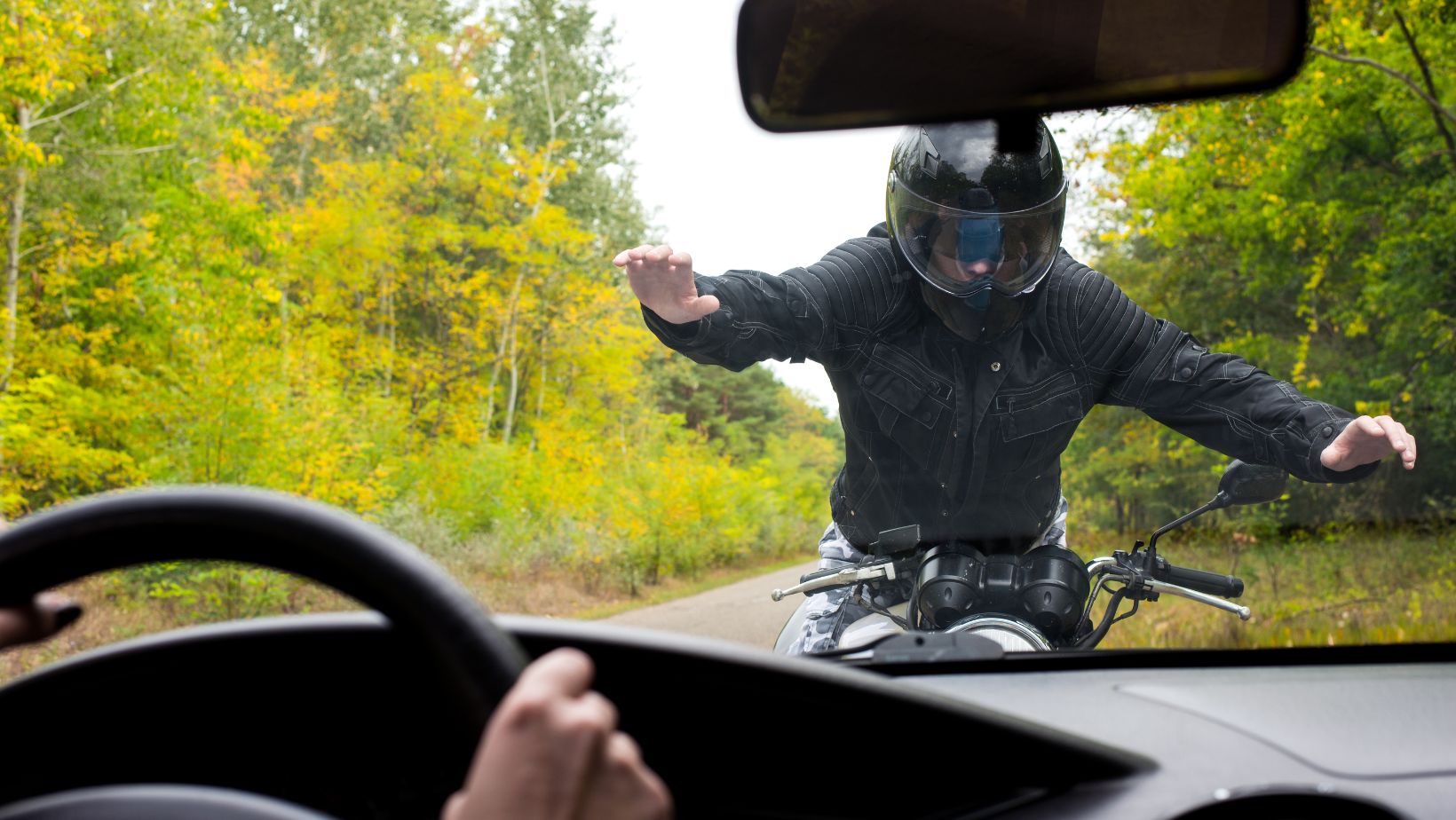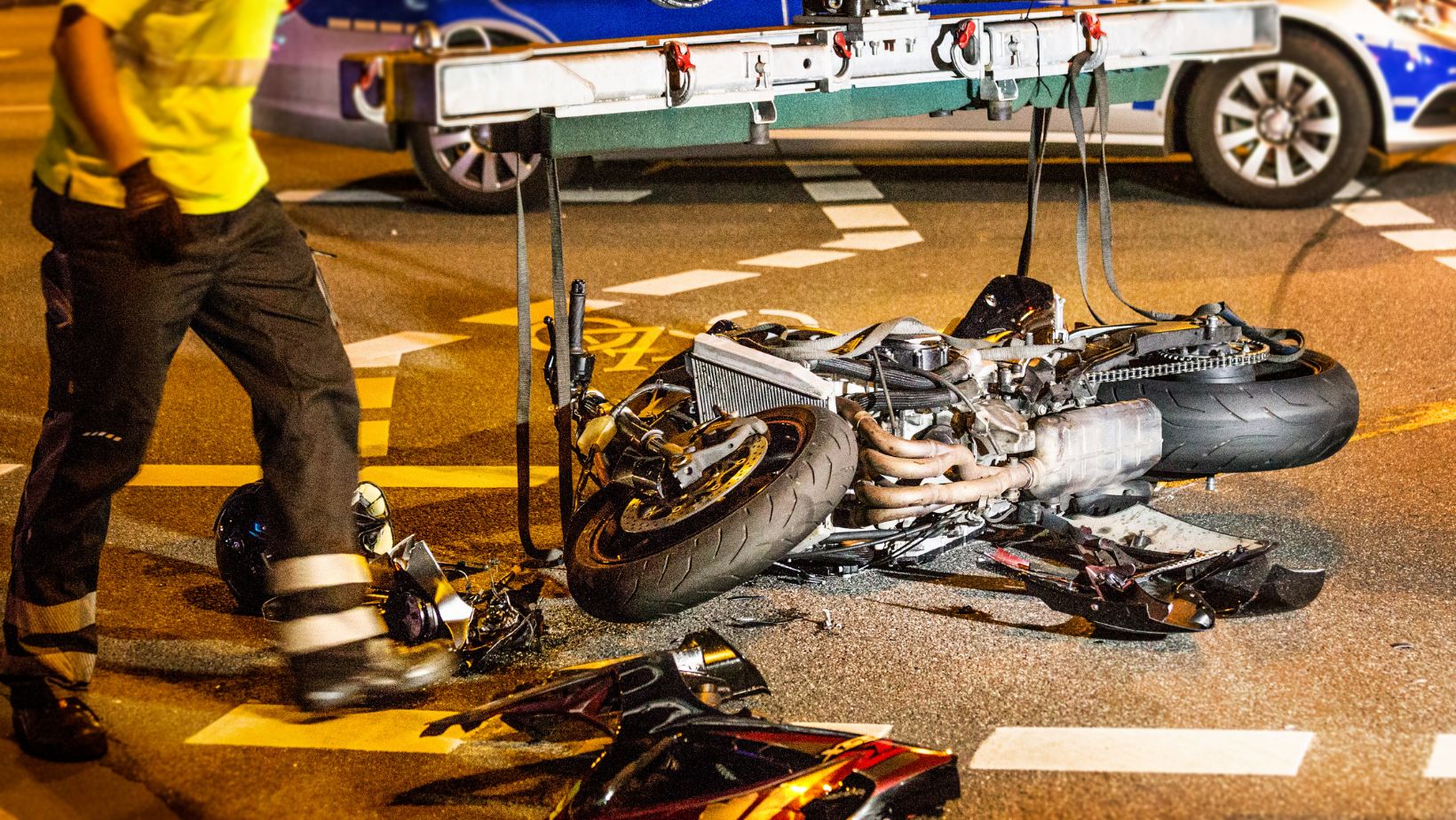Been in a motorcycle crash? You’re not alone. Accidents on American roads cause more than 82,000 injuries annually so understanding post-accident actions helps improve recovery outcomes and strengthens legal claims.
Motorcycle accidents tend to produce more serious injuries compared to those that happen in car crashes. Motorcycles represent only a small fraction of road vehicles yet account for almost 16% of fatal vehicle accidents.
This guide details the essential steps to follow after a motorcycle accident that will safeguard your well-being and secure your legal rights as well as your financial stability.
What You Need to Know Right Now
- What to do immediately after a motorcycle accident
- When and how to seek medical attention
- How to document your accident properly
- When to contact a personal injury attorney
- Understanding insurance claims after motorcycle accidents
- Common mistakes to avoid during the legal process
Immediate Steps After a Motorcycle Accident
The initial seconds following an accident are extremely important. Here’s what you need to do:
1. Get to Safety
If it’s possible to move, you should take yourself to a secure area that is not near any traffic lanes. This helps prevent additional injuries. If you’re seriously injured stay where you are until help arrives.
2. Call 911
Make sure to contact the police following every motorcycle crash regardless of its apparent severity. You need an official police report for:
- Insurance claims
- Potential lawsuits
- Documentation of the scene
3. Seek Medical Attention
Never refuse medical care at the scene. Serious injuries from accidents may not show symptoms immediately even when you feel fine. The danger of weekend motorcycle riding is demonstrated by the fact that nearly half of all motorcycle fatalities take place during these days.
Allow the ambulance crew to perform a medical examination once they reach the scene. The most important thing is your well-being while proper medical records remain essential for filing future claims.
4. Exchange Information
Whenever possible gather contact and insurance details from all drivers involved in the accident. Make sure to get:
- Full names and contact information
- Insurance company names and policy numbers
- Driver’s license numbers
- License plate numbers
- Make and model of all vehicles involved
Documenting Your Motorcycle Accident
Your case outcome depends heavily on how well you document the event. Here’s how to gather evidence that matters:
1. Take Photos
Use your phone to take pictures of:
- Damage to your motorcycle
- Damage to other vehicles
- The overall accident scene
- Road conditions
- Traffic signs or signals
- Your injuries
- Weather conditions
2. Identify Witnesses
Search your surroundings for people who witnessed the accident occur. Get their names and contact information. Statements from witnesses can serve as vital evidence to back up your account of events.
3. Make Personal Notes
Write down everything you remember about the accident as soon as you can. Include:
- How the accident happened
- Weather and road conditions
- Describe your actions and activities immediately preceding the crash.
- What the other driver was doing
- Any statements made by the other driver
Seeking Medical Treatment
Proper medical treatment serves as a critical component for maintaining your health and supporting your legal case.
1. Get Comprehensive Medical Evaluation
Visit a doctor within 24 hours of the accident even if you received clearance from emergency services at the scene. Some injuries don’t show symptoms immediately, including:
- Concussions and traumatic brain injuries
- Internal bleeding
- Soft tissue injuries
- Spinal injuries
The summer months of June, July, and August bring a rise in motorcycle accidents leading to busy medical facilities yet receiving a medical check-up remains crucial.
2. Follow All Medical Advice
Follow your doctor’s instructions exactly. This includes:
- Taking all prescribed medications
- Attending follow-up appointments
- Completing recommended therapy
- Getting any suggested tests or scans
3. Keep Detailed Medical Records
Save everything related to your medical care:
- Doctor’s notes and reports
- Hospital discharge instructions
- Receipts for medications
- Physical therapy records
- Medical bills
When to Contact an Attorney
Securing legal representation shortly after your accident greatly affects the result of your case. Victims of motorcycle accidents who consult with a personal injury attorney in Kennesaw or their local area typically receive up to 40% more in insurance settlements compared to those who handle claims on their own.
Signs You Need Legal Help
Consider hiring a lawyer if:
- You suffered serious injuries
- Multiple vehicles were involved in the accident because 62% of motorcycle fatalities include several vehicles.
- The other driver was clearly at fault
- Your medical bills are substantial
- You’ve missed work due to injuries
You should provide the attorney with your police report, medical records from your injuries, photos from the accident scene, and contact details for potential witnesses when you meet.
3. Questions to Ask Your Motorcycle Accident Attorney
During your consultation, ask:
- Which number of motorcycle accident cases have you managed previously?
- How much of your legal practice focuses on personal injury cases?
- Can you handle cases that go to trial when settlements fail?
- How do you communicate with clients?
- What is your fee structure?
- What is my case potentially worth?
Dealing with Insurance Companies
After a motorcycle accident insurance issues can become complicated. Here’s how to handle them:
1. Notify Your Insurance Company
Immediately inform your insurance company about the accident while only providing essential details. Don’t give recorded statements without legal advice.
2. Be Careful What You Say
Insurance adjusters represent the insurance company’s interests rather than yours. Their role requires them to minimize insurance payouts. Never:
- Admit fault
- Speculate about what happened
- Minimize your injuries
- Accept the first settlement offer
3. Document All Communications
Create a detailed record of all communications with insurance companies.
- Names of representatives you spoke with
- Dates and times of conversations
- What was discussed
- Any offers made
Common Motorcycle Accident Injuries and Damages
By knowing which damages you can claim you can ensure fair compensation for your needs.
1. Physical Injuries
Common motorcycle accident injuries include:
- Road rash and skin abrasions
- Broken bones
- Head and traumatic brain injuries
- Spinal cord injuries
- Internal injuries
2. Types of Damages You Can Claim
You may be entitled to compensation for:
- Medical expenses (past and future)
- Lost wages and lost earning capacity
- Pain and suffering
- Emotional distress
- Property damage
- Rehabilitation costs
3. Long-Term Considerations
Some injuries require ongoing care. Make sure your settlement accounts for:
- Future medical treatments
- Long-term physical therapy
- Necessary modifications to your home
- Potential career changes due to disability
Legal Time Limits for Claims
Act swiftly to pursue legal action before deadlines expire. Each state implements rigid deadlines for submitting claims.
1. Statute of Limitations
The timeframe to file a lawsuit following an accident in most states ranges between 1 and 4 years. If you miss this deadline you will forfeit your claim for compensation.
2. Evidence Preservation
Evidence disappears over time. As time passes witness memories become less reliable while physical evidence may disappear. Prompt action allows you to maintain important evidence for your case.
Safety Tips for Future Rides
Keep these safety tips in mind while you manage your current accident so you can ride more safely in the future.
1. Proper Safety Gear
Your safety depends on wearing a DOT-approved helmet and protective jacket and gloves along with boots.
2. Defensive Riding
Motorcyclists should exercise heightened caution at intersections since left-turning vehicles frequently cause accidents with motorcycles. Ride your motorcycle under the assumption that other drivers won’t see you.
Wrapping It All Up
A motorcycle crash has the capability to transform your life within moments. Protecting both your health and legal rights requires taking immediate correct actions following an accident.
Remember these key points:
- Safety and medical care come first
- Proper documentation strengthens your case
- Getting legal advice as soon as possible after an accident usually results in improved results for the victim.
- Insurance companies aren’t on your side
- Time limits apply to all accident claims
After a motorcycle accident injury you should avoid managing your situation by yourself. Attaining complete physical healing and financial restitution requires both appropriate medical treatment and knowledgeable legal representation.
The high fatality and injury rate in motorcycle accidents makes it essential to have a clear action plan to positively influence your case outcome. Protect yourself and your future by following the steps from this guide.





